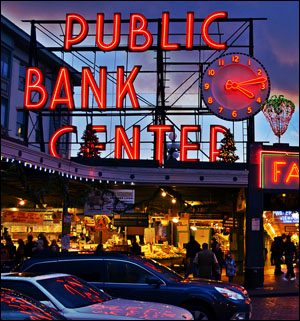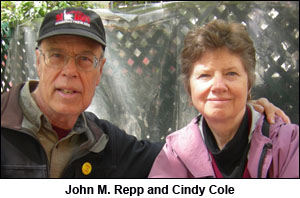OPINION
Establish Seattle Public Bank; learn more at Dec. 10 forum
By JOHN M. REPP and CINDY COLE
(Dec. 1, 2014) — An exciting proposal is being considered that could liquidate Seattle’s $4 billion debt, while creating the funding for the transition to renewable energy, for affordable housing, and for the creation of thousands of living wage jobs. This proposal could start a process of financial independence from Wall Street for our cities, counties, states, and eventually the nation. The proposal is to establish a public bank for Seattle.
 For five years a group of engaged citizens, now working as the Seattle Public Bank Coalition, has led efforts to establish a public bank. After watching the near collapse of the banking system brought about by the Wall Street driven financial speculation, the mergers and acquisition mania in banking over the past 35 years, and the collapse of the lending market in housing in 2008, they realized that there is a need for another banking model. With the possibility of another crash looming, local government financing of infrastructure and private lenders must be protected from the machinations of big banks.
For five years a group of engaged citizens, now working as the Seattle Public Bank Coalition, has led efforts to establish a public bank. After watching the near collapse of the banking system brought about by the Wall Street driven financial speculation, the mergers and acquisition mania in banking over the past 35 years, and the collapse of the lending market in housing in 2008, they realized that there is a need for another banking model. With the possibility of another crash looming, local government financing of infrastructure and private lenders must be protected from the machinations of big banks.
Fortunately, the model for such a public banking already exists — the Bank of North Dakota (BND). Its deposit base is the taxes and fees the state collects and its loan portfolio keeps the money local, often working through the community banking system.
Because BND has been in place 90 years, the community banking system in North Dakota is the most robust in the nation. In North Dakota the community banks remained engaged in loans for farmers, for small business, and home mortgages, because BND stood behind them as a banker’s bank. The community banks didn’t sell their loans to Wall Street or buy the exotic new financial instruments that crashed the global economy. As a consequence, North Dakota escaped the bad effects of the crash: high unemployment and home foreclosures. In addition, the state government has no debt because BND finances its capital projects.
The coalition has worked with state Sen. Bob Hasegawa (D-Seattle) to establish a public bank in Washington state, working to drum up popular support for the five bills he sponsored. Although Senator Hasegawa plans to continue to sponsor a public banking bill in Olympia, the State Legislature has not been favorable ground for such a bill.
Now the coalition has started to focus on the city of Seattle. Because Washington is a home rule state, the Seattle City Council has the authority to establish a public bank. Councilmember Nick Licata received a memo saying our courts would likely find that a public bank constitutional.
When the proposal was being worked at the state level, former State Supreme Court Justice Phil Talmadge stated, ”I am aware of nothing in the constitution that bars the state from creating a bank. There is no lending of credit problem (a constitutional provision) where the state gets a full return on its asset. The state has been in the business for many years of issuing bonds for housing assistance and taking deposits for guaranteed tuition programs, for just a couple of examples. Those are “lending” programs that have earmarks of bank-like activities.”
This is not an exotic proposal. All over the world much of the banking is done by public banks. Many central banks are public. However, our central bank, the Federal Reserve, is not, but is actually a consortium of the private banks.
In Germany, 40 percent of the deposits in banks are held by over 400 locally owned savings banks called Sparkasse. Public banking has played a role in the very popular transition to wind and solar power. The transition is popular because the wind and solar installations are locally owned and return a guaranteed profit to the millions of owners.
A San Francisco group is also working on public banking. They have proposed that other governmental jurisdictions around the city can buy into the bank. Officials of other local jurisdictions as well have expressed interest in buying into a Seattle public bank.
On Wednesday, Dec. 10, there will be a public forum on a Seattle Public Bank at University Temple, United Methodist Church, 1415 NE 43rd beginning at 7 p.m. with Nick Licata of the Seattle City Council. Dr. Thomas Keidel of the German Public Savings Banks, the Sparkassen, will talk about their 150-year-old local system. Dr. Karl Beitel, from the University of California at Davis and the San Francisco Public Banking Project, will tell the public about their efforts. And Gwendolyn Hallsmith of Vermont and the executive director of the Public Banking Institute will explain the national movement for public banking. Questions and answers will follow a panel discussion moderated by Wayne Lau, a retired banker and Executive Director of the Rainier Valley Community Development Fund.
Click here for details.
for details.
Cindy Cole retired from SEIU 925 and works with 925 active retirees. John M. Repp retired from Boeing and is a delegate for SPEEA/IFPTE 2001 on the Martin Luther King, Jr. County Labor County. Both are active members of the Seattle Public Banking Coalition.





